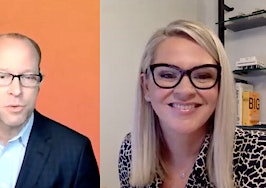Inman events are the best way to connect, learn and grow. Join us this week, Oct. 26-28, for Inman Connect Las Vegas, in-person or virtually. Then, continue to gain insights, strategies, and tactics to keep your business growing and make 2022 your best year ever with a full line-up of 2022 events! Save the dates, and register now!
In a wide-ranging speech on the real estate market Wednesday at Inman Connect, Redfin CEO Glenn Kelman expressed skepticism about the potential growth of iBuying, and said he’s seeing a growing divide between brokerage models that offer more support and those that offer more money.
The speech — which came during a session dubbed “Will Things Ever Be the Same?” — was based on a survey Redfin just completed of more than 400 real estate professionals in 60 different U.S. metro areas.
Among other things, the survey found that 30 percent of agents foresee iBuyers such as Opendoor, Offerpad and Redfin itself growing to have between 5 and 10 percent of the real estate market. Another 30 percent of agents believe iBuyers will capture between 10 and 25 percent share, and 15 percent of agents envision the iBuyers could grow to between 25 and 50 percent of the market.
Kelman showed these findings and concluded that “the industry believes that iBuyers are going to keep going strong.”
However, Kelman himself, said he was “skeptical” of such growth — even though his own company is one of the most prominent iBuyers.
“We still see iBuying as fundamentally less efficient,” he explained, noting that unlike in a traditional real estate transaction an iBuyer deal ultimately involves three owners, rather than two.

Glenn Kelman on stage at Inman Connect Wednesday. Credit: AJ Canaria of MoxiWorks
What Kelman does think agents need to be aware of is “disintermediation” — or in other words the reduced need for and use of intermediaries such as agents in real estate. He went on to explain that there are times when Redfin agents call an iBuyer to show a house and the iBuyer responds by suggesting the consumers download an app and view the property on their own. The idea is that the iBuyers “don’t make it easy for the real estate agent,” Kelman said.
Kelman concluded that disintermediation has already started, and that agents “don’t want to work for a brokerage that’s pretending that’s not going to happen.” Instead, agents should look for a brokerage that is prepared for this trend.
Beyond iBuying, Redfin’s survey also found that agents are equally split between those who want more services related to things such as technology and marketing, and those who simply want bigger commissions.
While revealing those findings, Kelman showed a slide with eXp and others on one side of the screen that was labeled “favorable splits, so agents can pay portals.” The other side of the screen showed Redfin and Compass, which were labeled as companies that make “tech, brand investments; $ to compete with portals.”

A slide Kelman presented on stage at Inman Connect. Credit: Redfin
Kelman characterized these different companies as capturing two competing philosophies about real estate, and said there is a “broader schism in the industry” over which one is best. He didn’t ultimately say one approach would win out over the other, but did indicate such a divide is a growing theme in real estate.
“Are we going to make that aggressive investment or are we going to offer agents a better deal?” Kelman said. “I think it is going to lead to a real divide in the industry.”

Glenn Kelman on stage at Inman Connect Wednesday. Credit: AJ Canaria of MoxiWorks:
Kelman weighed in on a variety of other topics as well. He recalled, for instance, Redfin’s move away from pocket listings and ultimately concluded that the practice of withholding listings from the broader market is “obviously bad for most listing customers” because it involves not showing property “to the maximum number of buyers.”
And Kelman also argued that pocket listings disproportionately impact minority homebuyers.
“When you talk to people of color,” Kelman said, “it effects them asymmetrically because they’re the ones who can’t break into these exclusive neighborhoods.”
View Kelman’s full slideshow here:









